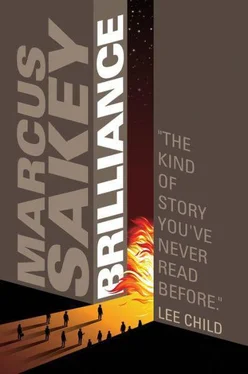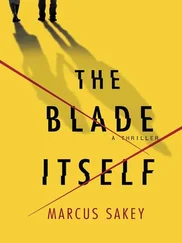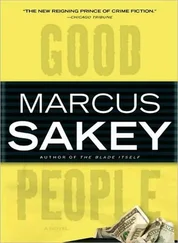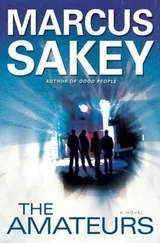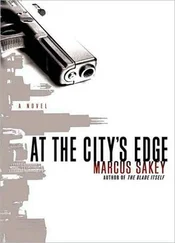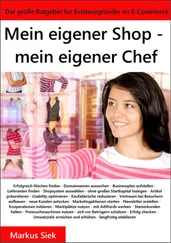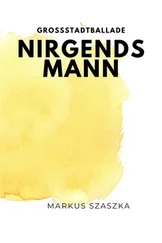Bryan Vasquez cocked his head and turned to lean against the window with his arms crossed. “I don’t know. I’ve never had to betray something I believe in to save my sister before.”
“Fair point.” He let the silence hang. Bryan looked like a man who expected to be punched; slowly he realized the blow wasn’t in the air. A faint wind howled along the edge of the glass, and somewhere far away, a car horn. Finally, he moved to the desk and slumped awkwardly in the chair on the other side, all angles and elbows.
“I know this is hard,” Cooper said. “But you’re doing the right thing.”
“Sure.” The word drifting across the table.
“Can I tell you something?” He waited until the other man looked up. “Everything you said the other day about the way gifted are treated? I agree.”
“Right.”
“I’m an abnorm.”
Bryan’s face crinkled in conflicting directions: surprise and disbelief and anger. Finally the guy said, “What is it for you?”
“Pattern recognition, a sort of souped-up intuition. I read intention. That can be really specific, like knowing where someone is going to throw a punch. But personal patterns work, too; I get to know somebody, my gift forms a picture of them, helps me guess what they’ll do.”
“So if you’re gifted, what are you doing—”
“—working for the DAR?” Cooper shrugged. “Actually, pretty much the same reasons you helped your sister.”
“Bullshit.”
“It’s not. I want my children to live in a world where abnorms and straights coexist. The difference is, I don’t think you get there by blowing things up. Especially when one group vastly outnumbers the other. See, normal people, like you ,” he gestured with palms together, “if you decided to, you could wipe out all the people like me . Every one of us, or close enough it wouldn’t matter. It’s a numbers game. You have ninety-nine to every one of us.”
“But that’s exactly why—” Bryan Vasquez stopped. “I mean.”
“I know how you feel about the way Alex is treated. But you’re an engineer. Think logically. The relationship between norms and brilliants, it’s gunpowder. You really want to strike sparks?”
He pulled the stamp drive from his pocket, set it on the desk, halfway between them. “Don’t forget,” Cooper said, “you’re not doing this for me. You’re doing it for Alex.”
It was a calculated play, backing up the philosophical get-out-of-jail-free card with a personal imperative. And it was far from the first time he had lied to a suspect.
So why am I feeling guilty about it?
The academy. Seeing that place had stirred up issues he thought he’d made peace with. Cooper pushed away thoughts of the playground, of the woman with the placard, and locked down his expression.
Bryan Vasquez took the stamp drive.
Cooper said, “Let’s go.”
“This is Quarterback. The ball is in play; repeat, Delivery Boy is moving. Headquarters, confirm.”
“Confirmed,” Bobby Quinn’s voice crackled in his ear. “Both signals are strong.”
The square across the street looked as planned and uninviting as ever, the black branches of manicured trees tossing in the wind. A couple of hardy souls huddled around the entrance to the nearest building, rocking from foot to foot as they sucked on cigarettes. The entrance to Metro Center Station had a steady stream of traffic. A row of newspaper dispensers, bright red and orange and yellow, ran along a low wall; at the end of it a man in a wheelchair shook a paper cup at passersby.
Cooper kept his stance casual, pitched his voice low. “God, what have you got?”
“Delivery Boy is heading north on 13th.”
“Clear view?”
“God sees all, my son.”
Everything is in place. You’re about to be a step closer to catching the most dangerous man in America.
Across the street, the agent at the FedEx truck finished loading his dolly and started for the near building. In a bench on the square, two women in business casual chatted as they picked at salads. One looked like the assistant principal of a middle school; the other was petite and lithe as a soccer player.
“How you doing, Luisa?”
“Never thought I’d say this,” dabbing at her lips with a napkin to cover the motion of her lips, “but I actually wish I was back in that cow-humping Texas backwater we just left.”
Luisa Abrahams was barely over five feet, pretty but not beautiful, famous for talking like a trucker, and perhaps the most stubborn person he knew. He’d picked her for his team after a mess of an op where her agent in charge had lost communication with her. The AIC hadn’t realized that her cover was blown and she needed support, so Luisa had chased a target two miles on foot, finally run him down, finished the job, and then called the AIC using her target’s cell phone. The insults she’d hurled at him circulated the agency for weeks.
Now she sat on a bench alongside Valerie West, the two of them pretending to be on their lunch. Val was a whiz with data analysis, but nervous in the field. Cooper was watching her shred her napkin, and weighing whether it was worth it to say something when Luisa touched the other woman’s knee, said something off-mic. Valerie nodded, shrugged her shoulders back, and tucked the napkin in her pocket. Good. Normally Cooper would have discouraged a romantic relationship between teammates, but the two often seemed better agents because of it.
Half a block away, Bryan Vasquez appeared in the crowd, walking behind a pair of tourists draped in cameras.
“All eyes,” he said. “Delivery Boy is here.”
Cooper ran through a mental checklist, making sure that everything was in place. Between the tracker, the cameras, the airship, and the agents, they had the corner locked down tight. Whoever came to meet Bryan Vasquez was going to be sitting in an interview room within an hour, bathing in that hopeless light and wondering just how true the rumors about Equitable Services’ “enhanced interrogation” privileges were.
Too bad we can’t let them walk and follow them to others. The payoff could be sweet, but the risk was simply too great; with an attack imminent, if their only lead got away, it could cost God knew how many lives.
Through the earpiece Cooper could hear the calls and confirmations of his team tracking Bryan Vasquez. The man was walking on the other side of the street, and Cooper carefully didn’t look quite at him. Just loosened his stance and opened up his senses, trying to take in the whole scene, to parse it, filter for the pattern beneath. The faded yellow blur of a taxi. The texture of a tweed coat. The smells of auto exhaust and cooking grease from a fast-food restaurant. The dull platinum glow of the sky and the shadowless noon it created. The determined set of Bryan Vasquez’s shoulders as he stepped onto the sidewalk and turned to look around. The clanging of a flagpole halyard driven to dance by the wind. The bright red and yellow newspaper dispensers behind Vasquez. The muted rumble of the Metro and the rot smell of the sewer grate and the squeal of brakes two blocks down and the very, very pretty girl talking on the cell phone.
A man in an oxblood leather jacket crossed the street toward Vasquez. There was purpose in his stride, a vector Cooper could see as if it was drawn with an arrow.
“Possible ID, leather jacket.”
In his ear, the team confirmed the sighting. On the bench, Luisa set down her salad and put a hand on her purse.
Vasquez turned to face the guy, his eyes a question.
The man in the leather jacket slipped his hand in his right front pocket.
Читать дальше
